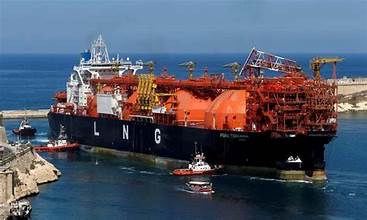Islamabad — Qatar has formally asked Pakistan to submit a definitive proposal regarding the future of surplus LNG cargoes under long-term contracts, as Islamabad struggles with declining domestic gas demand and a growing oversupply crisis, The News reported.
The request comes amid Pakistan’s worsening gas consumption scenario, with Pakistan LNG Limited (PLL) already diverting one long-term LNG cargo per month — originally contracted with Italy’s ENI — to the international spot market since February 2025. These diversions will continue through December 2025 due to a sharp drop in power and industrial sector demand.
Qatar Awaits Written Proposal
A senior Pakistani official confirmed that Qatar is open to negotiations but awaits a written proposal from Islamabad. “Once Pakistan submits a formal written proposal, Qatar will respond with a counter-proposal. A final decision will be made if both parties reach mutual agreement,” the official said.
Pakistan previously requested to defer 177 LNG cargoes — valued at $5.6 billion — beyond 2030, but the initial plan incorrectly included cargoes from ENI, which fall outside Qatar’s supply agreements. Under a revised strategy, Pakistan plans to utilize 80 of the 108 annual Qatari cargoes, leaving a surplus of 28 cargoes per year — a total of 140 cargoes over five years, worth approximately $4.437 billion.
Legal and Contractual Complications
The challenge for Pakistan lies in the rigid “Take-or-Pay” clauses embedded in its two long-term LNG contracts with Qatar — a 15-year deal at 13.37% of Brent (five cargoes/month) and a 10-year deal at 10.2% of Brent (four cargoes/month). These contracts were originally signed to supply four RLNG-based power plants in Punjab.
However, with current gas usage falling far below contractual commitments, the Petroleum Division is seeking relief under Qatar’s Net Proceeds Differential (NPD) clause — which allows Qatar to resell the cargoes on the global market. Under this clause, Qatar retains all profits from international sales while Pakistan bears any losses if the market price is lower than the contractual rate.
Ground Realities: Crippling Oversupply
Pakistan’s domestic gas demand has dropped drastically. Power sector RLNG consumption now stands at just 510 mmcfd, down from a contracted 800 mmcfd. RLNG usage by export industries has plummeted from 350 mmcfd to only 100 mmcfd, as soaring gas prices — Rs3,500 per MMBtu plus a 5% levy — make consumption unaffordable.
This demand collapse has led to over-pressurization of the gas network. Officials warn that RLNG line-pack pressure has crossed 5.170 billion cubic feet (bcf) — above the 5 bcf danger threshold — risking a system failure. In response, local gas fields producing 270–400 mmcfd have been shut down, but this has introduced risks of permanent well damage and disrupted crude oil and LPG production.
Political and Economic Stakes
A high-level Pakistani delegation, led by Federal Petroleum Minister Ali Parvaiz Malik, visited Doha on August 25 to explain the country’s deteriorating demand landscape and explore flexibility within the existing agreements.
Officials insist that Pakistan values its LNG ties with Qatar, but they admit that the request to defer $4.437 billion worth of cargoes beyond 2030 lacks contractual backing. The proposed deferment period — mainly covering 2031 and 2032 — would require Doha’s explicit consent.
Adding further complexity, the Power Division no longer operates RLNG plants as “must-run” units. In 2020, it received ECC approval to reduce their take-or-pay status from 66% to 50%. Today, these plants are dispatched based on Economic Merit Order (EMO), making them less likely to run consistently — a political decision meant to curb rising electricity costs.
Mounting Financial Strain
Despite the diversion of ENI cargoes, Pakistan still faces an annual LNG oversupply of 24 cargoes, exacerbating financial strain. For FY2024–25 alone, RLNG worth Rs242 billion has been diverted to the domestic sector to manage the surplus.
Moreover, Pakistan State Oil (PSO), the government’s primary LNG importer, is bound to import nine Qatari cargoes every month — regardless of whether there’s demand or not — leaving no flexibility to adapt in real-time.
Read more: Trump Warns Israel Over Qatar Strikes, Calls Doha a “Great Ally” as Tensions Rise Across Region
The Road Ahead
Officials say the ball is now in Islamabad’s court to submit a legally sound and commercially feasible proposal that can trigger a response from Doha. Until then, Qatar has indicated it will not consider any concessions.
Energy analysts warn that unless Pakistan renegotiates or restructures its long-term contracts, it will continue to suffer operational, financial, and political fallout from an LNG surplus it cannot consume — nor afford to waste.
Outlook
With the winter season approaching and gas demand still uncertain, Pakistan must urgently craft a proposal that balances its energy needs, fiscal realities, and diplomatic relationships. A misstep could risk both energy security and long-term strategic ties with one of its most reliable LNG partners.




Comments are closed, but trackbacks and pingbacks are open.